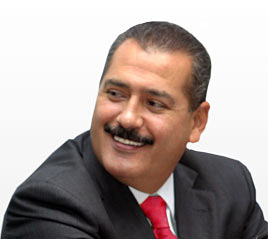
|  |  |  Editorials | Issues | November 2009 Editorials | Issues | November 2009  
Will the U.S. Media Meddle in Mexico's Presidential Race?
 Patrick Corcoran - mexidata.info Patrick Corcoran - mexidata.info
go to original
November 24, 2009


| | Manlio Fabio Beltrones |  |
On February 23, 1997, the obscure governor of the vast Mexican border state of Sonora was introduced to American readers in the most unflattering of lights. The New York Times, the most trustworthy of sources, accused Manlio Fabio Beltrones at great length of protecting drug traffickers, including Mexico's foremost villain, Amado Carrillo, who was known as the "Lord of the Skies."

Splashy though it was, the article quickly faded from memory; Beltrones was just one more mid-level Mexican politician to be accused of wrongdoing, and every other week seemed to produce a comparable new scandal from the world of drug trafficking.

Today, Beltrones is probably the second most powerful politician in Mexico, and his relevance only grows as Felipe Calderón eases toward lame-duckness. As Senate leader of the decisive congressional party, Beltrones has as much of an impact on Mexico's legislative agenda than anyone. His party, the PRI (Institutional Revolutionary Party), is the odds-on favorite to win the presidency in 2012; should the present favorite, State of Mexico Governor Enrique Peña Nieto, stumble (and the whispers that he is an empty suit unready for the big leagues keep growing), then Beltrones would be a logical stand-in.

It turns out, then, that Beltrones isn't just one more politician who might be dirty, but a potential president. So what about the accusations from The New York Times article?

The piece, which totaled 3,500 words and was the product of a months-long investigation, features hordes of quotes from lots of American officials, who in turn based their opinions on reports from their anonymous Mexican sources. Throughout the piece, clauses indicating a lack of certainty popped up. For instance:

“Although Mr. Francisco had no direct or specific evidence to document his allegations, he called for a criminal investigation that could lead to Mr. Beltrones's indictment in the United States.”

Another example:

"Mr. Beltrones was said to have attended three meetings at the ranch from 1990 to 1993, and the officials said Mr. Carrillo Fuentes was present for at least one."

And finally this:

"'In Mexico,' said one American prosecutor in a border state, 'political protection is difficult to prove. If we could prove it, we'd have them all under indictment. There's a big difference between knowing something and proving it in a court of law.'"

(Emphasis mine in every case.)

The problem with that quote, and indeed the entire article, is that the difference is not as big as the unnamed prosecutor imagines.

If there was an extensive connection between Amado Carrillo and Beltrones, why wasn't there a concrete piece of evidence, something beyond anonymous intelligence reports? Why wasn't there an incriminating tape, a known associate of Beltrones found with Carrillo’s henchmen, or a foreign bank account filled with unexplained millions? The absence of the above is not proof of Beltrones' innocence, but the piece is essentially 3,500 words based entirely on hearsay. The fact that the generators of said hearsay are presumably honest and dedicated American officials doesn't make it that much more believable.

If one wanted to damage a political rival, a group of zealous and powerful foreign officials, whose instinctive knowledge of the terrain suffers for their foreignness, would be the ideal vehicle with which to do so. And a powerful underworld enemy—for instance Carrillo, several of whose residences were seized by Beltrones—would have quite little trouble in starting an unsubstantiated but still noisy whisper campaign among local police, which would in due time make its way to the ears of the credulous American authorities.

Despite those limitations, the article remains a valuable cautionary tale for the American media and its consumers. Influential publications like The Atlantic, Forbes, The New Yorker, and Mother Jones (among many others) have all run lengthy articles on the Mexican drug wars in the past year, and while none have accused a public official quite as openly as did the Times piece from 1997, the articles have advocated some wild theories with very little basis in fact: the Mexican army is an organized drug gang, Mexico is a failed state, et cetera. Together, these articles demonstrate that whatever the hair-brained theory you want to proffer to explain life in Mexico today, you can find someone crazy enough to endorse it, and you can cherry pick a couple of facts to make it seem plausible. But that doesn’t make it true.

As to the truth of the original accusations, there are three possible explanations: Beltrones was and remains a corrupt official in the pay of organized crime; Beltrones had some shady connections at the time, but the publicity from the story sobered him up, and he has walked the straight and narrow since; or, as Beltrones vehemently insisted, the story was entirely bogus.

Whatever the case, the article remains a scab that will have more and more fingers picking at it the closer Beltrones comes to winning the PRI nomination.

Patrick Corcoran (corcoran25(at)hotmail.com) is a writer who resides in Torreón, Coahuila. He blogs at Gancho. |

 |
|  |



